 Miami-Dade: More than 20,000 new immigrant students have enrolled in Miami-Dade County public schools this year. Officials say it's a historic increase that's helping the school district grow for the first time in two decades. NPR. Meanwhile, a long-time teacher in Miami is retiring after 40 years on the job. Aldin Everette has been at Miami Edison Senior High since 1983. WPLG.
Miami-Dade: More than 20,000 new immigrant students have enrolled in Miami-Dade County public schools this year. Officials say it's a historic increase that's helping the school district grow for the first time in two decades. NPR. Meanwhile, a long-time teacher in Miami is retiring after 40 years on the job. Aldin Everette has been at Miami Edison Senior High since 1983. WPLG.
Duval: The school district here had more A-graded schools and better funding in place when Diana Greene's five-year tenure as superintendent ended on Friday. In addition, it had fewer students in traditional schools and fewer whom state-mandated testing considered proficient in subjects like English, math and science. Greene's replacement will have to weigh those facts in addition to goals from a Duval County School Board strategic plan and new material that includes an ongoing legal review of claims about teacher misconduct. The Florida Times-Union. Some are debating the right way to pronounce the name of Ribault High in Jacksonville. Some say "Ree-balt," while others think it's "Ree-beau." News 4 Jax.
Volusia: As most high-schoolers prepare for a four-year college education, a number of them are trying their hand at old and new skilled trades that are in demand. In Volusia County, Pine Ridge High School has opened its doors to multiple skilled trade options that could lead to six-figure salaries in specific trades. WKMG.
Food support: Local school districts in the bay area are ensuring kids don't go hungry by offering free breakfast and lunch through the Summer Food Service Program for Children. Officials say between 3,000 and 4,000 meals will be prepared daily throughout the summer. "When school is out, kids are still hungry, so this program allows us to provide nutritious breakfast and lunch to any child 18 and under throughout the whole county," said Shani Hall, general manager for student nutrition services in Hillsborough. ABC Action News.
Overdose policies: Naloxone is a medication that rapidly reverse the effects of an opioid overdose. Across the country, schools are working to stock up as the opioid crisis takes a fatal toll on students. According to 2022 study from the Journal of the American Medical Association, adolescent overdose deaths jumped from 492 in 2019 to 1,146 in 2021. Fox 4.
Union dues: Central Florida unions are getting creative when it comes to collecting members dues after a law passed making it illegal to deduct these fees from a person's paycheck. Ron Pollard, local president of the Orange Education Support Professionals Association, says without dues, unions die. Pollard is assisting teachers and support staff sign up for an alternative payment platform called e-dues through the Florida Education Association. Under the new law, 60% of all professionals represented by a union must be enrolled in that union in order for it to operate in Florida. WMFE.
Public schools poll: A new NPR/Ipsos poll dives into the battles that have been playing out in America's public schools this year. WBUR.
University and college news: Students at Florida Gulf Coast University created a Hurricane Ian aftermath website as their capstone project. Ten students were tasked with writing roughly six stories each, putting together audio projects, videos, and capturing photos for the website students created, swflafterian.org. Hurricane Ian made landfall in 2022 in Cayo Costa, a small barrier island west of Fort Myers, as a Category 4 hurricane. Eight months later, the region is still rebuilding. "I'm just really proud of them. They did a lot of good work," said Professor Judd Cribbs said. "I hope that gives them a taste of what the professional world of journalism is gonna be like if they get into it." Ft. Myers News-Press.
Opinions on schools: The window of opportunity for school choice is still open, but it's uncertain for how long. Rick Hess advises advocates on various ways they can take advantage, which include focusing on how school choice solves problems for parents and paying attention to details of how choice policies work for families and educators, explaining how choice policies better serve the public interest and ensuring that choice policies serve all families. Lindsey M. Burke and Jason Bedrick, reimaginED. Young minds need to learn how to think, not what. Teach history, yes. But forcing things — agenda-bending, ideological service and the like — only add another murky veil to already complex material. Let them find the answers. Even middle schoolers do that. Bruce Anderson, The Ledger. Not only will more schools jack up their prices now that they know they can bill taxpayers for hefty chunks, more private schools will set up shop to cash in. Especially because in Florida, it's easy to open a school regardless of whether you're qualified to run one. Fiscal watchdogs and voucher critics predicted this cash grab would occur — that schools would raise tuition, pricing out some of the very families that voucher advocates claimed they were trying to help. Scott Maxwell, Orlando Sentinel. Language matters when it comes to talking about student learning, achievement and accountability. The United States need a K-12 accountability system that focuses on justice, not deficits. Jennifer Randall, The 74th.
 Around the state: The school board in Sarasota is expected to discuss a state-mandated character education program today, a first of its kind job apprenticeship program helps find opportunities for the blind and visually impaired, and Spanish-speaking school officers are needed. Here are details about those stories and other developments from the state’s districts, private schools, and colleges and universities:
Around the state: The school board in Sarasota is expected to discuss a state-mandated character education program today, a first of its kind job apprenticeship program helps find opportunities for the blind and visually impaired, and Spanish-speaking school officers are needed. Here are details about those stories and other developments from the state’s districts, private schools, and colleges and universities:
Duval: The Lift and Lead Conference, the first of its kind here, is helping the county reach a crucial goal: Hiring and retaining more Black and Hispanic men as teachers. The two-day conference is led by the Jacksonville Public Education Fund, which said that as of December 2022, there were 1,628 male teachers in Duval. As of February, the county had 509 Black male and 85 Hispanic male teachers, an increase from May 2021. News4Jax.
Sarasota: The school board here is expected to suspend its state-mandated character education program at a meeting today, calling it a "distraction" after criticism from a group of parents about the program's use of emotional and social learning. Character Strong, an education program, fulfills the character education requirements mandated by state law. Because character education is required, the board is expected to direct Interim Superintendent Allison Foster to find an alternative program. Sarasota Herald-Tribune.
Escambia: Schools Superintendent Tim Smith is facing pressure over the past few weeks as he finds himself having to defend the appointed superintendent system, and now, his job. Pensacola News Journal.
Teacher turnover: More teachers than usual exited the classroom after last school year, which confirms a longstanding fear that pandemic-era stresses would prompt an outflow of educators. Chalkbeat.
Teen drivers: Teens can lose their driver's license for skipping school or having tobacco. WKMG.
Apprenticeship program: The state Department of Education Division of Blind Services announced the first in the nation job apprenticeship program to create employment opportunities for blind and visually impaired individuals. Graduates will receive internationally-recognized portable credentials, and the training can be applied toward further post-secondary education. WFTV. Yahoo News.
School vouchers: Florida leaders are posted to expand school voucher programs to every student, a move praised by school choice advocates who say parents deserve state funding to help pay for their children's education. Critics, though, argue that an expansion will mean more public money spent on private, often religious schools that are able to operate without state oversight. Orlando Sentinel.
Spanish-speaking officers needed: A recent lockdown at Lake Worth Middle School highlights the need for Spanish-speaking school police officers. More than 37% of students are Spanish-speaking in the Palm Beach County school district, but Police Chief Sarah Mooney said only about 10% of their police force speaks Spanish. WPTV.
Book bans: Students statewide have pushed back against book bans as the scope of a new state law expands. Training for HB1467 says school media specialists should "err on the side of caution" if reading material aloud in a public meeting would make them uncomfortable. WUSF.
Opinions on schools: The Arkansas House of Representatives passed SB 294, also known as the Arkansas Learns Act. The bill will require Senate concurrence and then be sent to Gov. Sarah Huckabee Sanders. The bill would increase public school teacher pay and create the Education Freedom Account program. Matthew Ladner, reimaginED. Students will suffer from the dismantling of public universities, which are places to be exposed to “dangerous” ideas. Banning controversial speakers from campus makes them more alluring and less likely to be stripped down and their ideas subject to close examination. Jan Rogers, Tallahassee Democrat. Parental rights advocates don't trust parents. Kathie Obradovich, Florida Phoenix. Experiencing joy leads to health and wellness benefits that include reduced chance of heart attacks, lower cholesterol and blood pressure and a boosted immune system. Joy also positively impacts learning by enhancing children's cognitive abilities and increasing aptitude for making social connections. Juliette Cricket Heinze, The 74th.
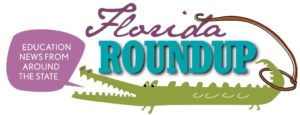 School libraries: HB 1467, signed into law last year, requires school districts to catalog every book in school libraries and establish a review process for parental complaints. "Every district is interpreting it all differently," said Jen Cousin a critic of the law and cofounder of Florida Freedom to Read. Tallahassee Democrat. Ocala Star Banner. Collier and Lee County public schools have banned or restricted 42 books combined. Collier has reviewed 115 books and banned three, while Lee has reviewed 33 books and banned just one under the new law. Other books are restricted to certain grade levels or require parental permission to read. Naples Daily News. A Hillsborough County Commissioner wants to expand the review process to public libraries in order to prevent youth from checking out controversial books their parents might object to. Tampa Bay Times.
School libraries: HB 1467, signed into law last year, requires school districts to catalog every book in school libraries and establish a review process for parental complaints. "Every district is interpreting it all differently," said Jen Cousin a critic of the law and cofounder of Florida Freedom to Read. Tallahassee Democrat. Ocala Star Banner. Collier and Lee County public schools have banned or restricted 42 books combined. Collier has reviewed 115 books and banned three, while Lee has reviewed 33 books and banned just one under the new law. Other books are restricted to certain grade levels or require parental permission to read. Naples Daily News. A Hillsborough County Commissioner wants to expand the review process to public libraries in order to prevent youth from checking out controversial books their parents might object to. Tampa Bay Times.
Legislature: A new bill proposal would change the way unions for public employees would be able to collect dues. The changes would impact the state's teacher union but not unions for law enforcement or firefighters. WFLA.
Escambia: Florida Rep. Michelle Salzman is calling for Tim Smith, the Escambia County School District Superintendent, to step down from his position. Pensacola News Journal. Carol Cleaver of the Escambia County Education Association says the district is already down 27 teachers and has seven openings at one school alone. She worries that SB 202, a bill to expand eligibility to the Family Empowerment Scholarship program, would reduce funding for the district and prevent them from filling teacher spots for fewer students. WEAR.
Indian River: Brian Barefoot, Indian River County School Board member claims that a public education is under attack and that a "the biggest threat to national security threat this country faces is a deteriorating public education system." Barefoot also called on people to set aside divisiveness and work together for results. TC Palm.
Polk: Polk County Schools are heading to Puerto Rico to recruit teachers and support staff. WFTS.
Seminole: An Orlando area police officer was charged with a DUI after crashing his pickup truck as he tried to pickup his daughter at Choices in Learning Elementary School in Winter Springs. WESH.
Florida Policy Institute: Florida Policy Institute offered a rebuttal to the House Fiscal Analysis that HB 1 would cost $209 million, a far cry from the think tank's $4 billion estimate. The left-of-center think tank and scholarship critic claims the House analysis made several errors. However, it should be noted that FPI's original estimate included students who were already enrolled in private schools through existing scholarship programs. FPI. WPTV.
National: Republican Senators in Idaho killed an education savings account plan, claiming they had no idea how much the program would cost. The defeat of the program came after the Idaho Center for Fiscal Policy announced the program would cost $45 million in the first year and balloon to $363 million within a few years. The think tank claimed it based its estimates on growth from similar programs in Arizona and Florida and cited the left-of-center Florida Policy Institute and Grand Canyon Institute, both critics of school vouchers. It should be noted that the Idaho-based think take made some poor assumptions as the group estimated that 12% of the state's public school students will accept the voucher, almost double the rate in Florida which is home to the nation's largest K-12 private school scholarship programs. Florida Politics. Idaho Statesman.
 Legislature: WFSU takes a look at the top issues the Florida legislature will be tackling in 2023. School vouchers come out on top of the list. WFSU.
Legislature: WFSU takes a look at the top issues the Florida legislature will be tackling in 2023. School vouchers come out on top of the list. WFSU.
Flagler: A Florida teen was held on $1 million bail after brutally attacking a teacher aid who confiscated his Nintendo Switch. WFLA. WESH. Flagler County voted down an effort to ban the book "Sold" from public school libraries. A second effort to ban the book on appeal will take place March 6. The book is one of 44 challenges requesting the banning of 22 books at district schools. Flagler Live.
Hillsborough: Black community members criticized Hillsborough County Public Schools plan to change school attendance zones. Meanwhile, parents of the wealthy south Tampa suburbs defended their efforts to keep school zones intact for their higher income neighborhoods. Board members unanimously voted to delay and workshop the plan further on March 9. Tampa Bay Times. WFLA.
Leon: Tallahassee Community College (TCC) announced the name of its new charter school, Tallahassee Collegiate Academy. One of the community college's trustees, Karen Moore, is listed as the charter school's founder. Moore will be stepping down as one of the trustees to helm the Board of Governors at the charter school. TCC received $2 million from the legislature to create a charter school on its campus. TCC was one of five colleges chosen to open new charter schools. Tallahassee Democrat.
Manatee: Manatee County Public Schools have seven named after local Black educators, entrepreneurs and leaders. The Bradenton Herald shines a spotlight on these schools. Bradenton Herald.
Palm Beach: Palm Beach County reveals what its newest high school, Dr. Joaquín Garcia High, will look like when it opens for the 2023-24 school year. The new school will serve 2,600 students in grades 9 through 12. Construction of the high school took two-years at a cost of $103 million. Palm Beach Post.
Pasco: Pasco County school board members are considering more restrictions on cell phone use at schools. John Legg recommended returning to old rules where students were required to keep phones off and out of sight except in cases of emergencies. Pasco currently allows students to access phones before and after class and during lunch. Tampa Bay Times.
Pandemic: Public school districts ramp up spending of Federal funds meant to alleviate schools from the effects of the COVID-19 pandemic. Schools had until Sept. 2024 to spend the funds and most of the money was saved during the first months with spending doubling this year over last. Marguerite Roza makes the case on how school districts can spend the remaining funds to benefit students. The 74. Last year, 82 students in Leon County were subject to a Baker Act, whether voluntarily or involuntarily, by a medical professional over mental health issues. Officials say there has been an increase in Baker Acts among youth since the start of the pandemic. Tallahassee Democrat.
 Around the state: A group of parents are rallying behind an Orange County teacher, a principal was arrested in Brevard, a theater company created an independent library of banned books and students in Broward participated in a teddy bear drive for first responders to give to children. Here are details about those stories and other developments from the state's districts, private schools and colleges and universities:
Around the state: A group of parents are rallying behind an Orange County teacher, a principal was arrested in Brevard, a theater company created an independent library of banned books and students in Broward participated in a teddy bear drive for first responders to give to children. Here are details about those stories and other developments from the state's districts, private schools and colleges and universities:
Broward: Students at Bayview Elementary in south Florida took part in a teddy bear drive for first responders to give to children years after a boy was killed in a plane crash. Ft. Lauderdale police officers picked up dozens of teddy bears collected by students. The drive was organized by Taylor's Teddy Bears, a nonprofit that collects stuffed bears for first responders to give to children. WSVN.
Hillsborough: A week before a key vote on school boundary changes and closures, some members of the Hillsborough County School Board indicated they might not be ready to take action. A special meeting and first vote is scheduled for Feb. 28 on sweeping changes that are designed to fix both school crowding and vacancies, while saving money. Board member Lynn Gray, concerned about pending legislation that would expand the state's school voucher system, said she fears funding levels and enrollment could drop dramatically, making it impossible to make an informed decision on new attendance boundaries at this time. Tampa Bay Times.
Manatee: Officials this week echoed Gov. Ron DeSantis by suggesting key changes to public library policies that give parents more control over what children are allowed to read. The updates to library protocols are the latest culture war development from the board of county commissioners here. Miami Herald.
Orange: A group of Orange County parents want school officials to reinstate a teacher accused of using children as "political pawns" in a series of TikTok videos, including some that took aim at book bans. Ethan Hooper, a sixth-grade language arts teacher at Howard Middle, was put on administrative leave and faces being fired by the school district after he posted the videos. Orlando Sentinel.
Brevard: The principal of Learning Forward Education Center in Melbourne was arrested this week for allegedly abusing a child with special needs. WESH.
School vouchers: Two Central Florida lawmakers who support a "transformational" expansion of the state's school voucher programs are closely tied to private schools that already receive hundreds of thousands of dollars from families who use state scholarships to pay tuition. Orlando Sentinel. Speaking of vouchers, the discussion over so-called "school vouchers" has long been a contentious battle in education politics, and GOP lawmakers are pushing to expand the voucher program if all goes well with the state Legislature. But legislation has became fraught with confusion and disagreements over allowing students to attend private schools using taxpayer dollars. Florida Phoenix.
Banned books: The book battle brewing in schools prompted a St. Petersburg theater company to help create an independent library full of banned books. Titles such as "To Kill a Mockingbird" and "Anne Frank: The Diary a Young Girl" now have a new home at the American Stage Theater Company. The theater company, along with Keep St. Pete Lit and Tombolo Books, created the independent library of banned books at St. Pete College. Fox 13.
College savings for newborns: States, cities and community groups that offer free money to families to jumpstart college savings face a dilemma: The families most in need sometimes don't sign up. To solve that problem, some states have transformed the accounts into automatic programs that help all families. The initiative comes at a time when even affluent families are struggling to afford college. The 74th.
University and college news: A South Florida professor's job may be in jeopardy after a parent complained to the president of Palm Beach Atlantic University about a racial justice unit included in Samuel Joeckel's Composition II course, prompting the dean and the provost to let the professor know the renewal of his contract has been delayed, pending review of the unit. South Florida Sun-Sentinel.
Opinions on schools: Texas Monthly featured the tale of Dripping Springs Independent School District and how it plays into a vast right-wing conspiracy to destroy public education. Matthew Ladner, reimaginED. Great Hearts Academies launched in 2001 with 130 students. Today, it operates 33 classical K-12 schools serving more than 25,000 students in Arizona and Texas. Rick Hess, reimaginED. A Florida mom wants education savings accounts to become a reality. Lisa Buie, reimaginED.
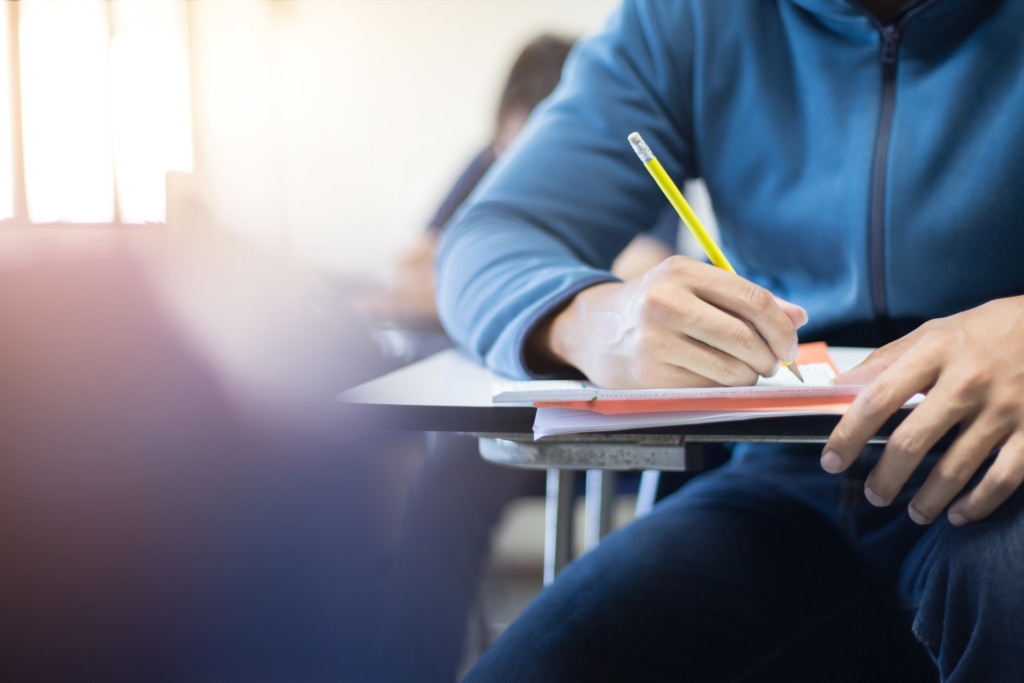
When it comes to Florida’s public education system, good news does not travel fast.
The latest examples: Two encouraging reports that got zero traction in mainstream media circles.
The first is a rigorous study published by the National Bureau of Economic Research. It found that as America’s largest private school choice program grew, so did positive impacts on Florida’s public schools.
The second is the latest College Board report on Advanced Placement. Florida again ranks No. 3 in the percentage of graduating seniors who’ve passed college-caliber AP exams, even though it has a higher percentage of low-income students of any Top 10 state but one.
To date, neither report has received any coverage from any of the scores of mainstream media outlets in Florida, including the dozens that report state education news. (The choice report did get a thorough write up in Education Week.) Nor, as far as I can tell, has either report gotten even a perfunctory attaboy from the mainstream organizations that represent Florida parents, teachers and school boards.
This is not a surprise (see here, here and here) but it’s still a shame. Florida public schools haven’t reached the promised land. But they’ve come a long ways since the 1990s – when barely half of Florida students graduated from high school – and shouldn’t be denied accolades from those who claim to be their biggest supporters. One sad reason why is because acknowledging their progress would mean conceding that the expansion of education choice has not hurt Florida’s public education system – and probably helped it.
The new NBER paper shows exactly that.
As the Florida Tax Credit Scholarship expanded – it now serves more than 100,000 low-income students – students in Florida public schools most impacted by the competition saw higher test scores, fewer absences and fewer suspensions. In other words, Florida public schools didn’t get decimated when more parents got more power to choose. They got better. (The scholarship is administered by nonprofits such as Step Up For Students, which hosts this blog.)
How dissonant to hear, in the report’s wake, nothing but crickets. Especially now. The Florida Tax Credit Scholarship has never faced more media scrutiny.
Ditto for Florida’s other private school choice options. Last year, the state’s leading newspaper editorialized that creation of the state’s newest K-12 voucher, the Family Empowerment Scholarship, was “the death sentence for Florida’s public schools.” A sham “analysis” that followed warned of dire financial consequences for districts – and managed to spawn at least 10 news stories statewide.
This year’s coverage of a proposed expansion for the new scholarship (also administered in part by Step Up) is hardly more grounded. This week, it spurred a five-alarm op-ed from a school board member whose district has the state’s biggest black-white achievement gap. “Vouchers hurt all,” read the headline. “Time is running out,” the board member wrote, “to save traditional public schools from the steady march to privatization by the Florida Legislature.”
The shrug at Florida’s Advanced Placement success is even more curious. I’m a broken record about this (see here, see here, see … ????), so I won’t belabor the point. And I’ll continue to agree with thoughtful critiques. But the outcomes here are yet another sign that Florida public schools continue to get better at serving the low-income students who are now a solid majority.
Of the 53,543 graduates in the Florida Class of 2019 who passed an AP exam, 40.3 percent got an exam fee reduction available to low-income students. Of the Top 10 states, only California had a higher rate, at 42.2 percent. The two states ahead of Florida, Massachusetts and Connecticut, had fee reduction rates of 18.6 percent and 14.9 percent, respectively.
Given that it’s low-income parents who are most apt to seek school choice options, shouldn’t traditional public school supporters be the first to shout these results from the rooftops? Maybe if media coverage didn’t suggest the sky was falling, they’d venture up there – and see the big picture of a public education system that really is getting better.
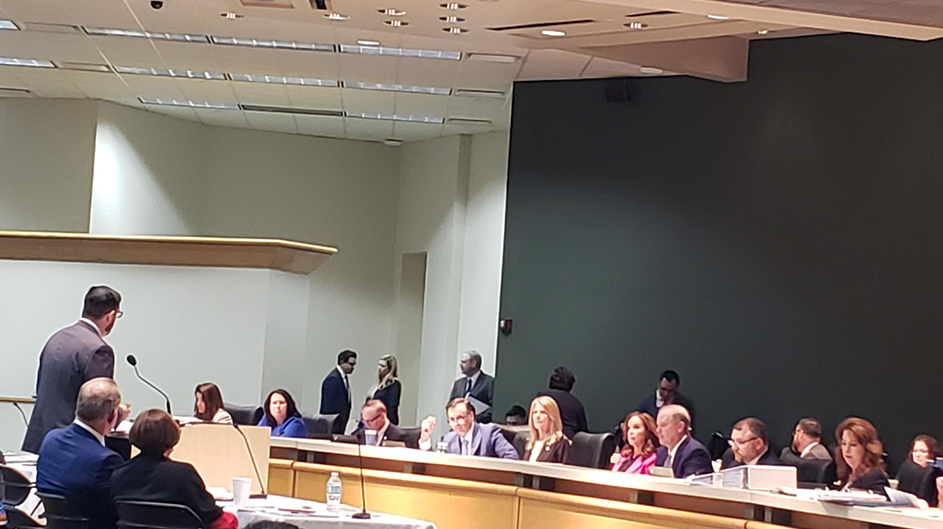
The Senate Appropriations Committee voted along party lines today to bolster and align two state scholarship programs that provide education choice to economically disadvantaged students.
SB 1220, a bill that spells out rules for teacher training and qualifications, also includes provisions aimed at aligning policies between the new Family Empowerment Scholarship, adopted last year and serving 18,000 students, and the Florida Tax Credit Scholarship, created in 2001 and serving 108,000 students.
Both scholarship programs serve students from lower-income and working-class families. The primary difference is that the Florida Tax Credit Scholarship is funded by corporations that receive a 100 percent tax credit, and the Family Empowerment Scholarship is funded directly from the state education budget.
The final vote was 13-8, with all Republicans supporting the bill. The bill now heads to the Senate floor. A similar bill in the House, HB 7067, is awaiting action on the floor there.
Several parents whose children receive scholarships attended the hearing in support of the bill, including Natalie Gillespie, a mother of nine from Tallahassee. She called the scholarships “life changing” and said her youngest three daughters, who are adopted, “can be nurtured in a smaller environment that is not as overwhelming to them.” Her son, now a successful employee at an insurance company, was able to attend a faith-based school that provided spiritual training and a “moral compass.”
The bill would increase the allowed enrollment growth in the Family Empowerment Scholarship. Under current law, the program can grow by up to 0.25 of total public school enrollment each year, which is roughly 7,000 students. SB 1220 and HB 7067 both increase that growth to 1 percent, or roughly 28,000.
A strike-all amendment proposed by Education Committee Chairman Manny Diaz, R-Hialeah, was intended to give clear priority to renewal students in both programs and also provided for a gradual increase in household income eligibility over time. That provision allows the eligible income level in the Family Empowerment Scholarship, currently 300 percent of federal poverty, to increase by 25 percentage points in the next year if more than 5 percent of the available scholarships remain unawarded.
The provision is also in the House bill. The income limit for Tax Credit Scholarships would remain at 260 percent of poverty.
Other parts of the bill approved today included:
 Editor's note: In case you missed it, click here to listen to Matt Ladner's recent interview on Phoenix-based public radio station KJZZ.
Editor's note: In case you missed it, click here to listen to Matt Ladner's recent interview on Phoenix-based public radio station KJZZ.
After claiming to have no desire to take choice away from the special populations eligible for Arizona’s Empowerment Scholarship Account program, opponents have filed a ballot proposition to do precisely that.
A group calling itself Save Our Schools Arizona has filed a new ballot initiative that will over time squeeze Native American students, military dependents and foster care children out of the program. Once the group has completed this task, it may further deny access to special needs children.
You can read the entire document by clicking the link above, or you can read the relevant portion of it below – the one that would create a statewide cap on the program equal to 1 percent of the total public-school population and that would create a rationing protocol.
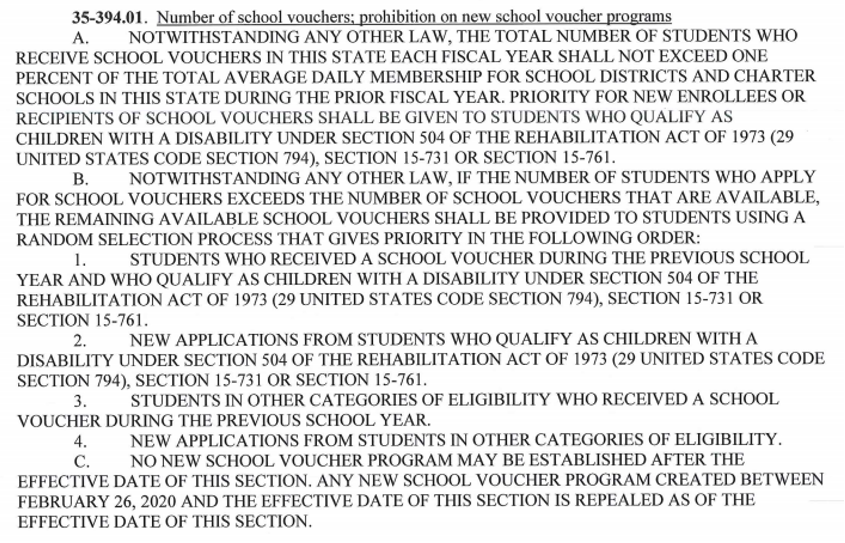
Arizona has more than 1.1 million K-12 students, so if this initiative were to become law, it would kick in at somewhere around 11,000 participants. With approximately 7,200 current participants, this is only a matter of time.
The Arizona Empowerment Scholarship Account program currently allows participation to students with disabilities (those with IEPs and 504 plans), those who have been through the foster care system, are attending D- and F-rated public schools, are the children of active duty military or their orphans, and those living on Native American reservations. If the initiative were to gain the necessary signatures and pass, students in all categories but children with disabilities would be squeezed from the program over time.
Arizona has more than 150,000 students either served under IDEA or with a Section 504 plan. The number of children with disabilities served in the Arizona public education system has nearly tripled since 1990.
A single-digit participation rate among these students would begin the process of squeezing other students out. A slightly larger but still single-digit participation rate would deny access to additional children with disabilities. When this would happen would depend on a variety of factors, but whether it will happen can’t be in doubt. The participation rate in special needs choice programs in Florida, for instance, is already well above the rate required to trigger rationing under this misguided proposal.
The number of signatures required for the proposition to make the ballot is substantially greater than that required to recall a piece of legislation as was the case with the previous Proposition 305. Save Our Schools leaders admit to using choice for their own children but plan to spend their summer collecting signatures attempting to diminish the opportunities for disadvantaged students to do the same.

The House Appropriations Committee on Tuesday voted along party lines to give 28,000 more economically disadvantaged students a shot at a K-12 private school option next year.
Under HB 7067, the Family Empowerment Scholarship program, which is serving 18,000 students in its first year, would be allowed to serve as many as 28,000 additional students next year. Under current law, the program could grow by 0.25 percent of the total public-school student enrollment, or roughly 7,000 students. The bill changes that amount to 1 percent.
The bill also would provide for a gradual increase in household income eligibility. Currently, the eligibility is limited to students whose household income does not exceed 300 percent of poverty, which is $78,6000 for a household of four. Under the bill, the eligibility limit would rise by 25 percentage points in any year in which more than 5 percent of the number of available Family Empowerment Scholarships are not awarded. Priority under the law would continue to go to households whose income does not exceed 185 percent of poverty, or $48,470.
The bill also makes changes to the Florida Tax Credit Scholarship program, allowing students who receive scholarships to remain the program until they enroll in a public school, graduate or turn 21 — aligning that provision with the Family Empowerment Scholarship.
The Florida Tax Credit Scholarship is administered by Step Up For Students, which hosts this blog, and serves 108,000 students from economically disadvantaged families. A similar bill, SB 1220, won approval earlier today from the Senate Education Appropriations Subcommittee.
More than 50 people attended the House Committee meeting prepared to speak in favor of the bill, including families who have benefited from the scholarship programs. Among them was Adriana Ortega, mother of a 9-year-old on a Florida Tax Credit Scholarship and a 6-year-old who participates in the Gardiner Scholarship program. Both attend Downey Christian School in Orlando.
“The scholarship has been a blessing to us,” Ortega said. “We need to ensure more Florida families can benefit from them.”
Nadia Hionides, principal of The Foundation Academy, a faith-based and LGBTQ-affirming private school in Jacksonville, urged lawmakers to support the bill.
“I hope that whatever you decide to do leads to more options for more parents in the end,” she said.
Elijah Robinson, a senior at The Foundation Academy, told lawmakers the Florida Tax Credit Scholarship transformed his life after he endured two years of constant bullying at his public school.
“Please support this and bill and don’t do anything that will result in fewer scholarships,” he said.
Also included in the bill were changes to the Gardiner Scholarship program for children with unique abilities. Under the new law, eligible students who turn 3 after Sept. 1 would be qualified to receive a scholarship if funds are available instead of having to wait until the following year to apply.
Additionally, the bill would close scholarship accounts that have been inactive for two years instead of the current three years, paving the way for more students to be served.
The Gardiner Scholarship, created in 2014, allows parents of students with unique abilities to create a customized education program for their children and covers expenses beyond tuition including tutoring, therapies and curriculum materials. The program currently serves 13,000 students.
A companion bill that would revise eligibility requirements for the Gardiner Scholarship, sponsored by Sen. Keith Perry, R-Gainesville, SB 1164, is currently in the Senate Education Appropriations Subcommittee.
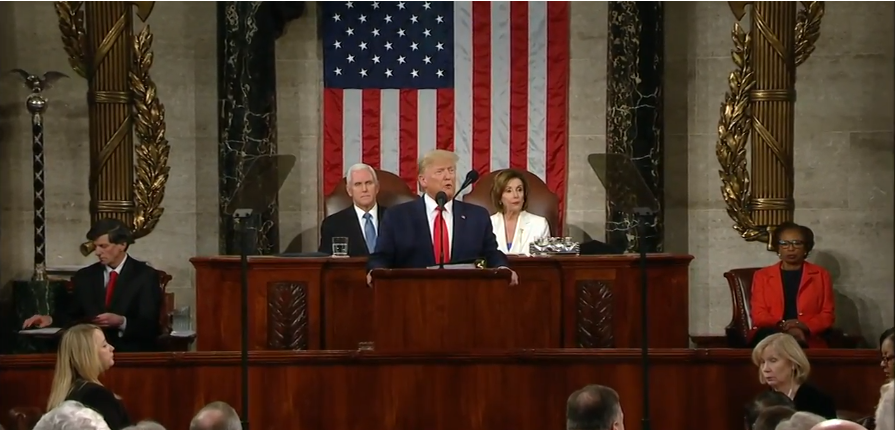 Somebody in the White House has been thinking. President Trump’s recent State of the Union address, while wanting perhaps in style, included a truly clever turn of the screw.
Somebody in the White House has been thinking. President Trump’s recent State of the Union address, while wanting perhaps in style, included a truly clever turn of the screw.
Trump stole an issue only Cory Booker among the Democrats dared to touch – school choice for low income families. Booker was ready to face the teachers union; the other candidates for the Democratic nomination were not, and now really cannot.
Trump now owns the issue, and it connects him to those individuals who are sick of having their kids conscripted for a school the child and family despise. Those persons had found the president wanting in this area, but he now will be a hero to thousands who have been crying for so long for an end to compulsion.
The details of any specific proposal will, of course, be crucial to its actual success. I trust this proposal will not be the sort of small and uniform voucher for rich and poor alike, the sort one associates with the late Milton Friedman. The rich do not need the help, and at most should qualify for a token subsidy. The need is centered on low and lower-middle income families who are simply stuck.
Could the federal government by itself afford to provide the necessary dollars for an authentic and sufficient subsidy for all the poor to have their choice of school? Of course not. But, properly designed, it could intensify popular awareness of the potential of reform at the state level.
One great stumbling block for school choice subsidies has been the 19th century adoption by most states of so-called Blaine amendments to their constitutions. These raised legal barriers to all financial aid to religious institutions. Such laws greatly limit the states’ ability to aid the parents’ choice of religious schools which make up most of the private sector. Happily, the Supreme Court has before it litigation which could well eliminate the problem by holding these 19th century relics of prejudice unconstitutional.
What will be the response of Democratic candidates to the dilemma Trump has posed for them? If they continue their hostility to forms of aid that allow the poor parent to choose, they will maintain the support of the teachers union but risk that of those low-income fathers and mothers who have enthusiastically stood for subsidies spendable in private school.
Trump now has in hand the sort of weapon he obviously prizes and perhaps should. He has his opponents clearly in his sights as hypocrites, the kind of slam they have so frequently given him. The Dems have made their careers as heroes of the poor. For whom will they be heroes now?